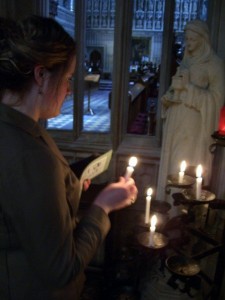A far-off song
Today, intent on both diligence and delight, I chose an off-beat tea shop called The Albion Beatnik Bookshop as my corner for study. Rapid, deadlined reading goes better when accompanied by a small blue pot of fragrant assam, acoustic music, and a flapjack (don't be fooled, this is a golden oatcakey bar, not a pancake). I settled back in my chair and began a thorough and very swift reading of George MacDonald's At the Back of the North Wind. Papers are due and brilliance must be attempted. Not a moment can I waste this week. But this passage stopped me still. My fretting eased and I tilted my head back, lifted my eyes to the line of blue sky just visible above the buildings out my window and felt the air of my spirit widening:
"How can you bear it North Wind? For I am sure you are kind; I shall never doubt that again." "I will tell you how I am able to bear it, Diamond: I am always hearing, through every noise, through all the noise I am making myself even, the sound of a far-off song. I do not exactly know where it is, or what it means; and I don't hear much of it, only the odour of its music, as it were, flitting across the great billows of the ocean outside this air in which I make such a storm; but what I do hear is quite enough to make me able to bear the cry from the drowning ship. So it would you if you could hear it."
At the Back of the North Wind is a fantasy novel about a little boy named Diamond who is befriended by the mighty and beautiful North Wind, borne in her arms on strange journeys. In the novel she is a figure of... God? The Holy Spirit? The presence of Love blowing through the world? I'm supposed to figure this out for my paper, but for now, I will say simply that she is a force of holiness, "blowing the world clean," bringing calamity and grace, always with the intent to "make the ugly beautiful."
The causing of calamity makes Diamond question how she can bear to bring pain. Earlier, she explains that sometimes it is the only way to waken people to good, but that passage above about the song that sings amidst the storm, that echoes down to us here and gathers, a rising, miraculous music to heal all grief - the fancy of it took my breath and I halted my study to savor it... just for a minute or two.
But tonight, as I sat in a dim, candlelit chapel, I felt that I actually heard it. I had come to Magdalene College to hear the evensong service. This is a nightly choral service that always includes several readings of Scripture, Mary's Magnificat, and Simeon's proclamation in Luke. The fact that I can attend one of these every night of the week makes me feel wealthier than if I owned a pot of gold. Settled in a high, wooden pew with prayer book in hand, I listened to the words of my faith blazed out in a weave of harmony that haled my soul into my throat. But it was Simeon's words, suddenly distinct, that sat me a little straighter amidst the candles and put me in mind of the North Wind's song:
Now Lord, may your bond servant depart in peace according to your word, for my eyes have seen your salvation, the light you have prepared in the sight of all nations, the glory of your people Israel...
I was gripped with the abrupt realization that the music heard by the North Wind is a real thing. The all-healing song whose echo she caught is in truth the news of the coming of Christ. I thought the picture in the novel so hopeful, a lovely, fantastical idea. But sometimes the symbols of a story can revitalize a truth you knew, but had forgotten to actively believe.
Sometimes a story can creep into your heart on the busiest of Saturdays amidst a cramming of study and strike you back awake to joy. The joining of the novel's words with the straight fact of Simeon's proclamation of Christ as Messiah made the truth of the symbol real. I have seen that salvation, I have heard that song. The North Wind's music is as real as my own skin. Here, now, amidst the bustle and study of my Oxford life, here, amidst the roar of the world and its countless suffering, hope-starved people, the music has come in the love of Christ. The song truly is among us now. We may sing and be healed.
And amidst the candlelight, with the choir singing its last amen, I was.
